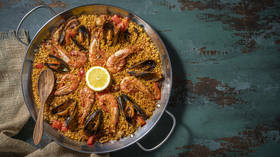Signature Spanish dish gets more expensive

The cost of the main groceries needed to cook paella in Spain soared 19.1% in February, compared to the same period a year ago, according to Bloomberg’s monthly Paella Index, which is based on data provided by Spain’s National Statistics Institute.
The price of olive oil reportedly surged the most, by 33.5%. Meanwhile, the prices of legumes and vegetables saw an increase of 23.6%, while the cost of rice jumped by 21.2%. Salt, spices and herbs became 17.1% more expensive. Prices of fresh and refrigerated fish gained 9.4%, while fresh and frozen seafood were up 7.9%.
Price growth among the items needed to make Spain’s signature dish reportedly recorded an all-time high. In comparison, the index saw a year-over-year increase of 9% in February 2022. In the year before that, growth was a mere 1.3%.
Food prices in Spain have continued to accelerate even after Madrid cut taxes on basic staples earlier this year. Last month, the government also raised the minimum living wage by 8%, marking the fifth increase since 2018. The authorities expect the measure to help people tackle the rise in food costs across the country.
In February, food inflation in Spain remained over 15%. In January, inflation eased from 15.7% recorded in December, but was still raging at a rate of 15.4% for food and non-alcoholic drinks, according the National Institute of Statistics (INE).
According to the Economy Ministry, a weather-driven drop in fruit and vegetable production alongside strong demand from abroad have sent prices skyrocketing.
For more stories on economy & finance visit RT's business section












